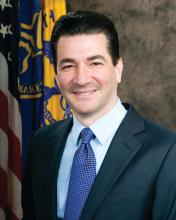The newly enacted Agriculture Improvement Act of 2018 legalizes hemp production and use, but the Food and Drug Administration’s regulation of cannabis and cannabis-derived products remains unchanged.
The act (H.R. 2) revamps federal authorities’ regulatory approach to hemp production. The law removes hemp from the Controlled Substances Act, which means it is no longer an illegal substance. Hemp is now defined as cannabis and derivatives of cannabis that have extremely low concentrations (less than 0.3%, on a dry weight basis) of the psychoactive compound delta-9-tetrahydrocannabinol (THC).
Despite hemp’s new legal status, FDA Commissioner Scott Gottlieb, MD, said the FDA’s regulation of cannabis and cannabis-derived products remains the same.
“In short, we treat products containing cannabis or cannabis-derived compounds as we do any other FDA-regulated products,” FDA Commissioner Scott Gottlieb, MD, said in a Dec. 20 statement published on the FDA website. That means “they’re subject to the same authorities and requirements as FDA-regulated products containing any other substance.”
The regulation of those products will be the same regardless of the source of the substance, including from plants classified as hemp. The FDA will require cannabis and cannabis-derived products to undergo testing similar to other drug products, given the concern regarding medical claims made about those products.
“Cannabis and cannabis-derived products claiming in their marketing and promotional materials that they’re intended for use in the diagnosis, cure, mitigation, treatment, or prevention of diseases (such as cancer, Alzheimer’s disease, psychiatric disorders and diabetes) are considered new drugs or new animal drugs,” Dr. Gottlieb explained. And they “must go through the FDA drug approval process for human or animal use before they are marketed in the United States.”
Selling unapproved products with unsubstantiated claims is a “violation of the law.”
In addition, “it’s unlawful under the [Food, Drug & Cosmetics Act] to introduce food containing added CBD [cannabidiol] or THC into interstate commerce, or to market CBD or THC products as, or in, dietary supplements, regardless of whether the substances are hemp derived,” Dr. Gottlieb noted. That’s because both CBD and THC are active ingredients in FDA-approved drugs.
Commissioner Gottlieb also noted that “pathways remain available for the FDA to consider whether there are circumstances in which certain cannabis-derived compounds might be permitted in a food or dietary supplement.” The FDA announced plans for a future meeting to discuss the lawful marketing of hemp-derived foods that do not contain CBD or THC.

